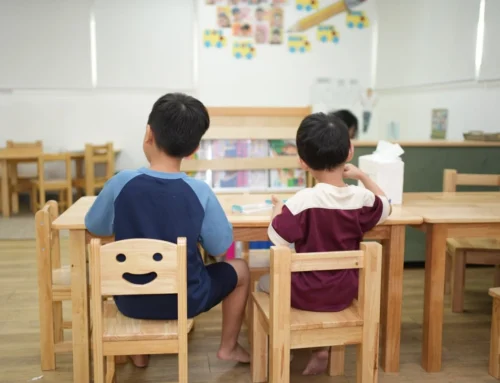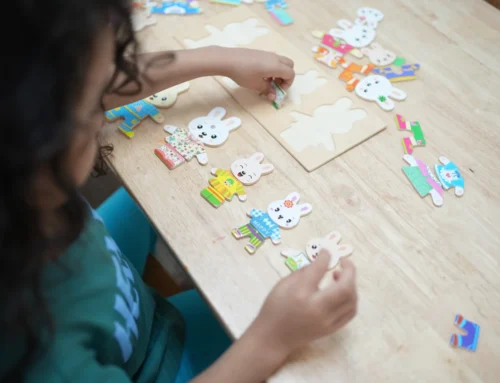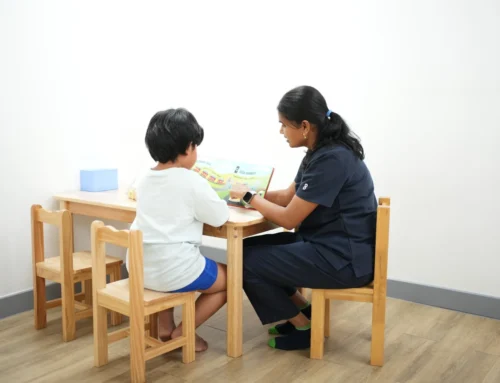Speech and communication are critical milestones in a child’s development. When a child struggles to speak or has difficulty forming words, expressing themselves, or understanding others, it can be a source of concern for parents and educators. These challenges often point to a condition known as speech delay. Fortunately, with early intervention and structured support like speech therapy, many children can overcome these hurdles and thrive academically and socially.
This blog post explores what speech delay is, its causes, warning signs, and how speech therapy in Phnom Penh—especially services like those offered by OrbRom Center—can help children communicate effectively and confidently.
What Is Speech Delay?
Speech delay is when a child is not developing speech and language skills at the expected rate. Every child develops differently, but certain age-related milestones are used as general guidelines. For instance, by age 2, most children can say around 50 words and start forming two-word phrases. If a child hasn’t reached these milestones, it may indicate a speech delay.
Speech delay is different from language delay. While speech focuses on how words are spoken (articulation, sound production), language is about understanding and using words to communicate. A child may understand everything but struggle to form clear speech.
Common Causes of Speech Delay
Several factors may contribute to delayed speech in children, including:
-
Hearing loss: Children with undiagnosed hearing impairments may struggle to hear and imitate sounds.
-
Autism Spectrum Disorder (ASD): Children with autism may have speech and language challenges tied to broader developmental delays.
-
Developmental delays or disorders: General delays in motor skills or cognitive development can also affect speech.
-
Oral-motor problems: Issues with the muscles involved in speech (lips, tongue, jaw) can impair clarity.
-
Environmental factors: Lack of verbal stimulation at home or reduced interaction can impact language development.
-
Neurological conditions: Conditions like cerebral palsy or traumatic brain injury can affect speech muscles and development.
Understanding the underlying cause is critical. That’s why professional developmental assessments are often the first step, such as those available at OrbRom Center.
Warning Signs of Speech Delay
Early identification of speech delay is key. Parents and teachers should watch for these signs:
-
By 12 months: No babbling or attempt to imitate sounds.
-
By 18 months: No spoken words, limited gestures, or poor response to verbal communication.
-
By 2 years: Vocabulary less than 50 words, difficulty combining two words.
-
By 3 years: Speech is unclear to strangers, limited sentence use.
-
Frustration or behavioral issues due to communication difficulties.
-
Poor social interaction, eye contact, or engagement in conversation.
If any of these signs are present, it’s best to consult a speech-language pathologist (SLP) as soon as possible.
How Speech Therapy Helps
Speech therapy involves the assessment and treatment of speech, language, and communication disorders. A trained speech-language pathologist creates a personalized plan based on the child’s specific needs. Here’s how it helps:
1. Improves Articulation
Children learn how to form sounds correctly using their lips, tongue, and mouth. Techniques include repetition, modeling, and phonemic awareness exercises.
2. Enhances Language Skills
Therapists work on vocabulary building, grammar, sentence formation, and understanding instructions or stories. This builds both expressive and receptive language.
3. Boosts Social Communication
Speech therapy helps children engage in conversations, take turns speaking, and understand non-verbal cues—skills that are crucial for friendships and school participation.
4. Strengthens Confidence
As children improve their ability to communicate, their confidence naturally grows. They feel more secure speaking up in class, expressing needs, and participating in play.
5. Addresses Feeding and Oral-Motor Concerns
Some speech delays are tied to oral-motor issues affecting both speech and feeding. Therapists may incorporate oral-motor exercises to improve jaw and tongue coordination.
What to Expect in a Speech Therapy Session
Speech therapy sessions are often fun, interactive, and play-based—especially for younger children. At centers like OrbRom Center in Phnom Penh, sessions are typically one-on-one and may include:
-
Sound games and flashcards
-
Picture books to build vocabulary
-
Role-playing or storytelling
-
Visual supports and sign language (when needed)
-
Sensory tools for children with sensory processing needs
The therapist will track progress over time and update the goals accordingly.
Home Strategies to Support Speech Development
While professional therapy is crucial, parents and caregivers play a major role in reinforcing speech skills at home. Here are some tips:
-
Talk often: Describe what you’re doing, seeing, or feeling to expose your child to language throughout the day.
-
Read together: Choose colorful picture books and ask open-ended questions like “What’s happening here?”
-
Sing songs: Rhymes and songs help with memory, rhythm, and language patterns.
-
Encourage choices: Ask questions like “Do you want juice or milk?” to promote word use.
-
Be patient: Give children time to respond without rushing to speak for them.
-
Limit screen time: Engage in real conversations instead.
Partnering with your child’s speech therapist will help you apply targeted techniques and track improvements.
Why Early Intervention Matters
The earlier speech delay is addressed, the better the outcomes. Children’s brains are most adaptable in the early years, and addressing communication difficulties before age 5 is ideal. Speech delays that go untreated can lead to:
-
Academic struggles, especially with reading and writing
-
Behavioral challenges due to frustration
-
Social isolation or low self-esteem
Early speech therapy intervention in Cambodia can make a significant difference in a child’s life, ensuring they are ready for school and equipped to express themselves clearly and confidently.
Choosing the Right Speech Therapy Center in Phnom Penh
When selecting a therapy provider, look for the following:
-
Licensed speech-language pathologists
-
Experience with diverse communication disorders
-
Individualized programs tailored to your child
-
A welcoming, child-friendly environment
-
Multidisciplinary support (e.g., OT, behavioral therapy)
OrbRom Center in Phnom Penh offers comprehensive speech therapy services backed by assessments, progress tracking, and parental guidance. Their team specializes in supporting children with autism, speech delay, and related developmental needs.
Final Thoughts
Speech delay can feel overwhelming for families, but it is treatable—and often highly responsive to early speech therapy. Whether your child is struggling with forming words, speaking clearly, or using full sentences, professional intervention can unlock their voice and empower their growth.
If you’re in Cambodia and looking for speech therapy in Phnom Penh, consider reaching out to OrbRom Center. Their skilled team works hand-in-hand with families to help children achieve confident communication and lifelong success.
We are the only Preschool specialized on children with special needs in PhnomPenh.
- Internationally qualified teachers
- Cambodia’s largest sensory room
- Outdoor swimming pool
- Covered outdoor playground
📞 Phone: 077.455.993
Telegram Link: https://t.me/OrbRom





